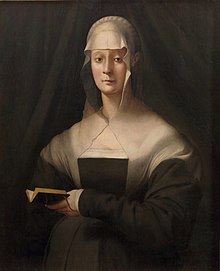Maria Salviati
This article needs additional citations for verification. (December 2015) |
Maria Salviati | |
|---|---|
 | |
| Born | 17 July 1499 Florence |
| Died | 29 December 1543 (aged 44) Villa di Castello |
| Noble family | Salviati (by birth) Medici (by marriage) |
| Spouse(s) | Giovanni dalle Bande Nere |
| Issue | Cosimo I de Medici |
| Father | Jacopo Salviati |
| Mother | Lucrezia di Lorenzo de' Medici |
Maria Salviati (17 July 1499 – 29 December 1543) was an Italian noblewoman, the daughter of Lucrezia di Lorenzo de' Medici and Jacopo Salviati. She married Giovanni dalle Bande Nere and was the mother of Cosimo I de Medici. Her husband died 30 November 1526, leaving her a widow at the age of 27. Salviati never remarried; after her husband's death she adopted the somber garb of a novice, which is how she is remembered today as numerous late portraits show her attired in black and white.[1]
Family
Maria Salviati was born in Florence. She descended from two of Florence's most powerful banking families: the Salviati on her father's side, and the Medici on her mother's. Salviati's maternal grandfather was Lorenzo "il Magnifico", a well-known politician and grandson to Cosimo de' Medici the Elder.
Life
When her cousin, Alessandro de' Medici was assassinated in 1537, Maria used her family connections to get involved in the discussions to decide the next Duke of Florence.[2] She played a key role in getting her son, Cosimo I de' Medici, elected.[2]
Descendants
Salviati's descendants became crowned figureheads of Europe over the succeeding generations. Her grandson Francesco I de' Medici married Johanna of Austria; they were the parents of Eleonora de' Medici, who married Vincenzo I Gonzaga and was the mother of Francesco IV Gonzaga. Francesco and Johanna's other daughter was Marie de' Medici, who married Henry IV of France and was the mother of Louis XIII of France and Henrietta Maria of France. Louis was the father of Louis XIV of France, Henrietta Maria was the mother of Charles II of England and James II of England.
Bia de' Medici

Maria set up residence at Villa di Castello in northern Florence, there she would look after her grandchildren. Her son Cosimo had an illegitimate daughter called Bia de' Medici. Maria described her granddaughter as a very happy and talkative little girl, often having long conversations with her.[citation needed]
Cosimo married Eleonora di Toledo in 1539. It was rumoured that Eleonora refused to tolerate Bia's presence in the palace after their marriage so Cosimo sent Bia off to live with Maria. Other sources say that Eleonora brought Bia up very lovingly. Bia shared a nursery with Giulia de' Medici an illegitimate daughter of Alessandro de' Medici, Duke of Florence, the pair being close in age. Maria knew who Bia's mother was but she would never tell Bia or anyone else the name of the woman. Both Bia and her cousin Giulia contracted a virulent fever; Giulia recovered from the illness but Bia only worsened and eventually died on 1 March 1542 aged only five years. Maria and Cosimo were said to be very sad by her loss.[citation needed]
Maria died one year after Bia on 29 December 1543.
Ancestors
Descendants
Maria Salviati 
|
Son: Cosimo I de' Medici  Grand Duke of Tuscany |
Grandson: Francesco I de' Medici  Grand duke of Tuscany |
Great-granddaughter: Marie de' Medici  Queen of France |
Great-Great-granddaughter: Henrietta Maria of France  Queen of England |
Great-Great-Great-granddaughter: Henrietta Anne Stuart  Duchess of Orleans |
References
- ^ For information on portraits of Maria Salviati see Carl Brandon Strehlke, Pontormo, Bronzino, and the Medici: The Transformation of the Renaissance Portrait in Florence (Philadelphia Museum of Art, 2004) cats. 30 and 46.
- ^ a b Tomas 2003, p. 5.
Sources
- Tomas, Natalie R. (2003). The Medici Women: Gender and Power in Renaissance Florence. Aldershot: Ashgate. ISBN 0754607771.
